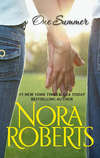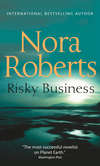Kitabı oku: «The Stanislaskis ( Books 1-6)», sayfa 17
“You’ve had a rough day,” he said so kindly Sydney gasped. “I don’t mean to make it worse.”
“It’s…” She struggled with a response. “It’s been a rough day all around. Let’s just put it behind us.”
“Done.” Smiling, he handed her a knife and fork. “Eat your dinner. We’ll have a truce.”
“Good.” She discovered she had an appetite after all.
CHAPTER FIVE
Sydney didn’t know how Mildred Wolburg’s accident had leaked to the press, but by Tuesday afternoon her office was flooded with calls from reporters. A few of the more enterprising staked out the lobby of the Hayward Building and cornered her when she left for the day.
By Wednesday rumors were flying around the offices that Hayward was facing a multimillion-dollar suit, and Sydney had several unhappy board members on her hands. The consensus was that by assuming responsibility for Mrs. Wolburg’s medical expenses, Sydney had admitted Hayward’s neglect and had set the company up for a large public settlement.
It was bad press, and bad business.
Knowing no route but the direct one, Sydney prepared a statement for the press and agreed to an emergency board meeting. By Friday, she thought as she walked into the hospital, she would know if she would remain in charge of Hayward or whether her position would be whittled down to figurehead.
Carrying a stack of paperbacks in one hand and a potted plant in the other, Sydney paused outside of Mrs. Wolburg’s room. Because it was Sydney’s third visit since the accident, she knew the widow wasn’t likely to be alone. Invariably, friends and family streamed in and out during visiting hours. This time she saw Mikhail, Keely and two of Mrs. Wolburg’s children.
Mikhail spotted her as Sydney was debating whether to slip out again and leave the books and plant she’d brought at the nurse’s station.
“You have more company, Mrs. Wolburg.”
“Sydney.” The widow’s eyes brightened behind her thick lenses. “More books.”
“Your grandson told me you liked to read.” Feeling awkward, she set the books on the table beside the bed and took Mrs. Wolburg’s outstretched hand.
“My Harry used to say I’d rather read than eat.” The thin, bony fingers squeezed Sydney’s. “That’s a beautiful plant.”
“I noticed you have several in your apartment.” She smiled, feeling slightly more relaxed as the conversation in the room picked up again to flow around them. “And the last time I was here the room looked like a florist’s shop.” She glanced around at the banks of cut flowers in vases, pots, baskets, even in a ceramic shoe. “So I settled on an African violet.”
“I do have a weakness for flowers and growing things. Set it right there on the dresser, will you, dear? Between the roses and the carnations.”
“She’s getting spoiled.” As Sydney moved to comply, the visiting daughter winked at her brother. “Flowers, presents, pampering. We’ll be lucky to ever get home-baked cookies again.”
“Oh, I might have a batch or two left in me.” Mrs. Wolburg preened in her new crocheted bed jacket. “Mik tells me I’m getting a brand-new oven. Eye level, so I won’t have to bend and stoop.”
“So I think I should get the first batch,” Mikhail said as he sniffed the roses. “The chocolate chip.”
“Please.” Keely pressed a hand to her stomach. “I’m dieting. I’m getting murdered next week, and I have to look my best.” She noted Sydney’s stunned expression and grinned. “Death Stalk,” she explained. “My first TV movie. I’m the third victim of the maniacal psychopath. I get strangled in this really terrific negligee.”
“You shouldn’t have left your windows unlocked,” Mrs. Wolburg told her, and Keely grinned again.
“Well, that’s show biz.”
Sydney waited until a break in the conversation, then made her excuses. Mikhail gave her a ten-second lead before he slipped a yellow rose out of a vase. “See you later, beautiful.” He kissed Mrs. Wolburg on the cheek and left her chuckling.
In a few long strides, he caught up with Sydney at the elevators. “Hey. You look like you could use this.” He offered the flower.
“It couldn’t hurt.” After sniffing the bloom, she worked up a smile. “Thanks.”
“You want to tell me why you’re upset?”
“I’m not upset.” She jabbed the down button again.
“Never argue with an artist about your feelings.” Insistently he tipped back her chin with one finger. “I see fatigue and distress, worry and annoyance.”
The ding of the elevator relieved her, though she knew he would step inside the crowded car with her. She frowned a little when she found herself pressed between Mikhail and a large woman carrying a suitcase-sized purse. Someone on the elevator had used an excess of expensive perfume. Fleetingly Sydney wondered if that shouldn’t be as illegal as smoking in a closed car.
“Any Gypsies in your family?” she asked Mikhail on impulse.
“Naturally.”
“I’d rather you use a crystal ball to figure out the future than analyze my feelings at the moment.”
“We’ll see what we can do.”
The car stopped on each floor. People shuffled off or squeezed in. By the time they reached the lobby, Sydney was hard up against Mikhail’s side, with his arm casually around her waist. He didn’t bother to remove it after they’d stepped off. She didn’t bother to mention it.
“The work’s going well,” he told her.
“Good.” She didn’t care to think how much longer she’d be directly involved with the project.
“The electrical inspection is done. Plumbing will perhaps take another week.” He studied her abstracted expression. “And we have decided to make the new roof out of blue cheese.”
“Hmm.” She stepped outside, stopped and looked back at him. With a quick laugh, she shook her head. “That might look very distinctive—but risky with this heat.”
“You were listening.”
“Almost.” Absently she pressed fingers to her throbbing temple as her driver pulled up to the curb. “I’m sorry. I’ve got a lot on my mind.”
“Tell me.”
It surprised her that she wanted to. She hadn’t been able to talk to her mother. Margerite would only be baffled. Channing—that was a joke. Sydney doubted that any of her friends would understand how she had become so attached to Hayward in such a short time.
“There really isn’t any point,” she decided, and started toward her waiting car and driver.
Did she think he would let her walk away, with that worry line between her brows and the tension knotted tight in her shoulders?
“How about a lift home?”
She glanced back. The ride home from her mother’s party was still a raw memory. But he was smiling at her in an easy, friendly fashion. Nonthreatening? No, he would never be that with those dark looks and untamed aura. But they had agreed on a truce, and it was only a few blocks.
“Sure. We’ll drop Mr. Stanislaski off in Soho, Donald.”
“Yes, ma’am.”
She took the precaution of sliding, casually, she hoped, all the way over to the far window. “Mrs. Wolburg looks amazingly well, considering,” she began.
“She’s strong.” It was Mozart this time, he noted, low and sweet through the car speakers.
“The doctor says she’ll be able to go home with her son soon.”
“And you’ve arranged for the therapist to visit.” Sydney stopped passing the rose from hand to hand and looked at him. “She told me,” he explained. “Also that when she is ready to go home again, there will be a nurse to stay with her, until she is well enough to be on her own.”
“I’m not playing Samaritan,” Sydney mumbled. “I’m just trying to do what’s right.”
“I realize that. I realize, too, that you’re concerned for her. But there’s something more on your mind. Is it the papers and the television news?”
Her eyes went from troubled to frigid. “I didn’t assume responsibility for Mrs. Wolburg’s medical expenses for publicity, good or bad. And I don’t—”
“I know you didn’t.” He cupped a hand over one of her clenched ones. “Remember, I was there. I saw you with her.”
Sydney drew a deep breath. She had to. She’d very nearly had a tirade, and a lost temper was hardly the answer. “The point is,” she said more calmly, “an elderly woman was seriously injured. Her pain shouldn’t become company politics or journalistic fodder. What I did, I did because I knew it was right. I just want to make sure the right thing continues to be done.”
“You are president of Hayward.”
“For the moment.” She turned to look out the window as they pulled up in front of the apartment building. “I see we’re making progress on the roof.”
“Among other things.” Because he was far from finished, he leaned over her and opened the door on her side. For a moment, they were so close, his body pressed lightly to hers. She had an urge, almost desperate, to rub her fingers over his cheek, to feel the rough stubble he’d neglected to shave away. “I’d like you to come up,” he told her. “I have something for you.”
Sydney caught her fingers creeping up and snatched them back. “It’s nearly six. I really should—”
“Come up for an hour,” he finished. “Your driver can come back for you, yes?”
“Yes.” She shifted away, not sure whether she wanted to get out or simply create some distance between them. “You can messenger your report over.”
“I could.”
He moved another inch. In defense, Sydney swung her legs out of the car. “All right then, but I don’t think it’ll take an hour.”
“But it will.”
She relented because she preferred spending an hour going over a report than sitting in her empty apartment thinking about the scheduled board meeting. After giving her driver instructions, she walked with Mikhail toward the building.
“You’ve repaired the stoop.”
“Tuesday. It wasn’t easy getting the men to stop sitting on it long enough.” He exchanged greetings with the three who were ranged across it now as Sydney passed through the aroma of beer and tobacco. “We can take the elevator. The inspection certificate is hardly dry.”
She thought of the five long flights up. “I can’t tell you how glad I am to hear that.” She stepped in with him, waited while he pulled the open iron doors closed.
“It has character now,” he said as they began the assent. “And you don’t worry that you’ll get in to get downstairs and spend the night inside.”
“There’s good news.”
He pulled the doors open again as the car slid to a smooth, quiet stop. In the hallway, the ceiling was gone, leaving bare joists and new wiring exposed.
“The water damage from leaking was bad,” Mikhail said conversationally. “Once the roof is finished, we’ll replace.”
“I’ve expected some complaints from the tenants, but we haven’t received a single one. Isn’t it difficult for everyone, living in a construction zone?”
Mikhail jingled his keys. “Inconvenient. But everyone is excited and watches the progress. Mr. Stuben from the third floor comes up every morning before he leaves for work. Every day he says, ‘Mikhail, you have your work cut out for you.’” He grinned as he opened the door. “Some days I’d like to throw my hammer at him.” He stepped back and nudged her inside. “Sit.”
Lips pursed, Sydney studied the room. The furniture had been pushed together in the center—to make it easier to work, she imagined. Tables were stacked on top of chairs, the rug had been rolled up. Under the sheet he’d tossed over his worktable were a variety of interesting shapes that were his sculptures, his tools, and blocks of wood yet to be carved.
It smelled like sawdust, she thought, and turpentine.
“Where?”
He stopped on his way to the kitchen and looked back. After a quick study, he leaned into the jumble and lifted out an old oak rocker. One-handed, Sydney noted, and felt foolish and impressed.
“Here.” After setting it on a clear spot, he headed back into the kitchen.
The surface of the rocker was smooth as satin. When Sydney sat, she found the chair slipped around her like comforting arms. Ten seconds after she’d settled, she was moving it gently to and fro.
“This is beautiful.”
He could hear the faint creak as the rocker moved and didn’t bother to turn. “I made it for my sister years ago when she had a baby.” His voice changed subtly as he turned on the kitchen tap. “She lost the baby, Lily, after only a few months, and it was painful for Natasha to keep the chair.”
“I’m sorry.” The creaking stopped. “I can’t think of anything worse for a parent to face.”
“Because there is nothing.” He came back in, carrying a glass of water and a bottle. “Lily will always leave a little scar on the heart. But Tash has three children now. So pain is balanced with joy. Here.” He put the glass in her hand, then shook two aspirin out of the bottle. “You have a headache.”
She frowned down at the pills he dropped into her palm. True, her head was splitting, but she hadn’t mentioned it. “I might have a little one,” she muttered. “How do you know?”
“I can see it in your eyes.” He waited until she’d sipped and swallowed, then walked behind the chair to circle her temples with his fingers. “It’s not such a little one, either.”
There was no doubt she should tell him to stop. And she would. Any minute. Unable to resist, she leaned back, letting her eyes close as his fingers stroked away the worst of the pain.
“Is this what you had for me? Headache remedies?”
Her voice was so quiet, so tired that his heart twisted a little. “No, I have something else for you. But it can wait until you’re feeling better. Talk to me, Sydney. Tell me what’s wrong. Maybe I can help.”
“It’s something I have to take care of myself.”
“Okay. Will that change if you talk to me?”
No, she thought. It was her problem, her future. But what harm would it do to talk it out, to say it all out loud and hear someone else’s viewpoint?
“Office politics.” She sighed as he began to massage the base of her neck. His rough, calloused fingers were as gentle as a mother’s. “I imagine they can be tricky enough when you have experience. All I have is the family name and my grandfather’s last wishes. The publicity on Mrs. Wolburg has left my position in the company very shaky. I assumed responsibility without going through channels or consulting legal. The board isn’t pleased with me.”
His eyes had darkened, but his hands remained gentle. “Because you have integrity?”
“Because I jumped the gun, so to speak. The resulting publicity only made things worse. The consensus is that someone with more savvy could have handled the Wolburg matter—that’s how it’s referred to at Hayward. The Wolburg matter in a quiet, tidy fashion. There’s a board meeting at noon on Friday, and they could very well request that I step down as president.”
“And will you?”
“I don’t know.” He was working on her shoulders now, competently, thoroughly. “I’d like to fight, draw the whole thing out. Then again, the company’s been in upheaval for over a year, and having the president and the board as adversaries won’t help Hayward. Added to that, my executive vice president and I are already on poor terms. He feels, perhaps justifiably, that he should be in the number one slot.” She laughed softly. “There are times I wish he had it.”
“No, you don’t.” He resisted the urge to bend down and press his lips to the long, slender column of her neck. Barely. “You like being in charge, and I think you’re good at it.”
She stopped rocking to turn her head and stare at him. “You’re the first person who’s ever said that to me. Most of the people who know me think I’m playing at this, or that I’m experiencing a kind of temporary insanity.”
His hand slid lightly down her arm as he came around to crouch in front of her. “Then they don’t know you, do they?”
There were so many emotions popping through her as she kept her eyes on his. But pleasure, the simple pleasure of being understood was paramount. “Maybe they don’t,” she murmured. “Maybe they don’t.”
“I won’t give you advice.” He picked up one of her hands because he enjoyed examining it, the long, ringless fingers, the slender wrist, the smooth, cool skin. “I don’t know about office politics or board meetings. But I think you’ll do what’s right. You have a good brain and a good heart.”
Hardly aware that she’d turned her hand over under his and linked them, she smiled. The connection was more complete than joined fingers, and she couldn’t understand it. This was support, a belief in her, and an encouragement she’d never expected to find.
“Odd that I’d have to come to a Ukrainian carpenter for a pep talk. Thanks.”
“You’re welcome.” He looked back into her eyes. “Your headache’s gone.”
Surprised, she touched her fingers to her temple. “Yes, yes it is.” In fact, she couldn’t remember ever feeling more relaxed. “You could make a fortune with those hands.”
He grinned and slid them up her arms, pushing the sleeves of her jacket along so he could feel the bare flesh beneath. “It’s only a matter of knowing what to do with them, and when.” And he knew exactly how he wanted to use those hands on her. Unfortunately, the timing was wrong.
“Yes, well…” It was happening again, those little licks of fire in the pit of her stomach, the trembling heat along her skin. “I really am grateful, for everything. I should be going.”
“You have time yet.” His fingers glided back down her arms to link with hers. “I haven’t given you your present.”
“Present?” He was drawing her slowly to her feet. Now they were thigh to thigh, her eyes level with his mouth. It was curved and close, sending her system into overdrive.
He had only to lean down. Inches, bare inches. Imagining it nearly drove him crazy. Not an altogether unpleasant feeling, he discovered, this anticipation, this wondering. If she offered, and only when she offered, would he take.
“Don’t you like presents, milaya?”
His voice was like hot cream, pouring richly over her. “I…the report,” she said, remembering. “Weren’t you going to give me your report?”
His thumbs skimmed over her wrist and felt the erratic beat of her pulse. It was tempting, very tempting. “I can send the report. I had something else in mind.”
“Something…” Her own mind quite simply shut down.
He laughed, so delighted with her he wanted to kiss her breathless. Instead he released her hands and walked away. She didn’t move, not an inch as he strolled over to the shelves and tossed up the drop cloth. In a moment he was back, pressing the little Cinderella into her hand.
“I’d like you to have this.”
“Oh, but…” She tried, really tried to form a proper refusal. The words wouldn’t come.
“You don’t like?”
“No. I mean, yes, of course I like it, it’s exquisite. But why?” Her fingers were already curving possessively around it when she lifted her eyes to his. “Why would you give it to me?”
“Because she reminds me of you. She’s lovely, fragile, unsure of herself.”
The description had Sydney’s pleasure dimming. “Most people would term her romantic.”
“I’m not most. Here, as she runs away, she doesn’t believe enough.” He stroked a finger down the delicate folds of the ball gown. “She follows the rules, without question. It’s midnight, and she was in the arms of her prince, but she breaks away and runs. Because that was the rule. And she is afraid, afraid to let him see beneath the illusion to the woman.”
“She had to leave. She’d promised. Besides, she’d have been humiliated to have been caught there in rags and bare feet.”
Tilting his head, Mikhail studied her. “Do you think he cared about her dress?”
“Well, no, I don’t suppose it would have mattered to him.” Sydney let out an impatient breath as he grinned at her. It was ridiculous, standing here debating the psychology of a fairy-tale character. “In any case, it ended happily, and though I’ve nothing in common with Cinderella, the figurine’s beautiful. I’ll treasure it.”
“Good. Now, I’ll walk you downstairs. You don’t want to be late for dinner with your mother.”
“She won’t be there until eight-thirty. She’s always late.” Halfway through the door, Sydney stopped. “How did you know I was meeting my mother?”
“She told me, ah, two days ago. We had a drink uptown.”
Sydney turned completely around so that he was standing on one side of the threshold, she on the other. “You had drinks with my mother?” she asked, spacing each word carefully.
“Yes.” Lazily he leaned on the jamb. “Before you try to turn me into an iceberg, understand that I have no sexual interest in Margerite.”
“That’s lovely. Just lovely.” If she hadn’t already put the figurine into her purse, she might have thrown it in his face. “We agreed you’d leave my mother alone.”
“We agreed nothing,” he corrected. “And I don’t bother your mother.” There was little to be gained by telling her that Margerite had called him three times before he’d given in and met her. “It was a friendly drink, and after it was done, I think Margerite understood we are unsuitable for anything but friendship. Particularly,” he said, holding up a finger to block her interruption, “since I am very sexually interested in her daughter.”
That stopped her words cold. She swallowed, struggled for composure and failed. “You are not, all you’re interested in is scoring a few macho points.”
Something flickered in his eyes. “Would you like to come back inside so that I can show you exactly what I’m interested in?”
“No.” Before she could stop herself, she’d taken a retreating step. “But I would like you to have the decency not to play games with my mother.”
He wondered if Margerite would leap so quickly to her daughter’s defense, or if Sydney would understand that her mother was only interested in a brief affair with a younger man—something he’d made very clear he wanted no part in.
“Since I would hate for your headache to come back after I went to the trouble to rid you of it, I will make myself as clear as I can. I have no intention of becoming romantically, physically or emotionally involved with your mother. Does that suit you?”
“It would if I could believe you.”
He didn’t move, not a muscle, but she sensed he had cocked, like the hammer on a gun. His voice was low and deadly. “I don’t lie.”
She nodded, cool as an ice slick. “Just stick to hammering nails, Mikhail. We’ll get along fine. And I can find my own way down.” She didn’t whirl away, but turned slowly and walked to the elevator. Though she didn’t look back as she stepped inside, she was well aware that he watched her go.
At noon sharp, Sydney sat at the head of the long walnut table of the boardroom. Ten men and two women were ranged down either side with crystal tumblers at their elbows, pads and pens at the ready. Heavy brocade drapes were drawn back to reveal a wall of window, tinted to cut the glare of sunlight—had there been any. Instead there was a thick curtain of rain, gray as soot. She could just make out the silhouette of the Times Building. Occasionally a murmur of thunder sneaked in through the stone and glass.
The gloom suited her. Sydney felt exactly like the reckless child summoned to the principal’s office.
She scanned the rows of faces, some of whom had belonged in this office, at this very table, since before she’d been born. Perhaps they would be the toughest to sway, those who thought of her as the little girl who had come to Hayward to bounce on Grandfather’s knee.
Then there was Lloyd, halfway down the gleaming surface, his face so smug, so confident, she wanted to snarl. No, she realized as his gaze flicked to hers and held. She wanted to win.
“Ladies, gentlemen.” The moment the meeting was called to order she rose. “Before we begin discussion of the matter so much on our minds, I’d like to make a statement.”
“You’ve already made your statement to the press, Sydney,” Lloyd pointed out. “I believe everyone here is aware of your position.”
There was a rippling murmur, some agreement, some dissent. She let it fade before she spoke again. “Nonetheless, as the president, and the major stockholder of Hayward, I will have my say, then the meeting will open for discussion.”
Her throat froze as all eyes fixed on her. Some were patient, some indulgent, some speculative.
“I understand the board’s unease with the amount of money allocated to the Soho project. Of Hayward’s holdings, this building represents a relatively small annual income. However, this small income has been steady. Over the last ten years, this complex has needed—or I should say received—little or no maintenance. You know, of course, from the quarterly reports just how much this property has increased in value in this space of time. I believe, from a purely practical standpoint, that the money I allocated is insurance to protect our investment.”
She wanted to stop, to pick up her glass and drain it, but knew the gesture would make her seem as nervous as she was.
“In addition, I believe Hayward has a moral, an ethical and a legal obligation to insure that our tenants receive safe and decent housing.”
“That property could have been made safe and decent for half of the money budgeted,” Lloyd put in.
Sydney barely glanced at him. “You’re quite right. I believe my grandfather wanted more than the minimum required for Hayward. He wanted it to be the best, the finest. I know I do. I won’t stand here and quote you figures. They’re in your folders and can be discussed at length in a few moments. Yes, the budget for the Soho project is high, and so are Hayward standards.”
“Sydney.” Howard Keller, one of her grandfather’s oldest associates spoke gently. “None of us here doubt your motives or your enthusiasm. Your judgment, however, in this, and in the Wolburg matter, is something we must consider. The publicity over the past few days has been extremely detrimental. Hayward stock is down a full three percent. That’s in addition to the drop we suffered when you took your position as head of the company. Our stockholders are, understandably, concerned.”
“The Wolburg matter,” Sydney said with steel in her voice, “is an eighty-year-old woman with a fractured hip. She fell because the floor in her kitchen, a floor we neglected to replace, was unsafe.”
“It’s precisely that kind of reckless statement that will open Hayward up to a major lawsuit,” Lloyd put in. He kept his tone the quiet sound of calm reason. “Isn’t it the function of insurance investigators and legal to come to a decision on this, after a careful, thoughtful overview of the situation? We can’t run our company on emotion and impulse. Miss Hayward’s heart might have been touched by the Wolburg matter, but there are procedures, channels to be used. Now that the press has jumped on this—”
“Yes,” she broke in. “It’s very interesting how quickly the press learned about the accident. It’s hard to believe that only days after an unknown, unimportant old lady falls in her downtown apartment, the press is slapping Hayward in the headlines.”
“I would imagine she called them herself,” Lloyd said.
Her smile was icy. “Would you?”
“I don’t think the issue is how the press got wind of this,” Mavis Trelane commented. “The point is they did, and the resulting publicity has been shaded heavily against us, putting Hayward in a very vulnerable position. The stockholders want a solution quickly.”
“Does anyone here believe Hayward is not culpable for Mrs. Wolburg’s injuries?”
“It’s not what we believe,” Mavis corrected. “And none of us could make a decision on that until a full investigation into the incident. What is relevant is how such matters are handled.”
She frowned when a knock interrupted her.
“I’m sorry,” Sydney said, and moved away from the table to walk stiffly to the door. “Janine, I explained we weren’t to be interrupted.”
“Yes, ma’am.” The secretary, who had thrown her loyalty to Sydney five minutes after hearing the story, kept her voice low. “This is important. I just got a call from a friend of mine. He works on Channel 6. Mrs. Wolburg’s going to make a statement on the Noon News. Any minute now.”
After a moment’s hesitation, Sydney nodded. “Thank you, Janine.”
“Good luck, Ms. Hayward.”
Sydney smiled and shut the door. She was going to need it. Face composed, she turned back to the room. “I’ve just been told that Mrs. Wolburg is about to make a televised statement. I’m sure we’re all interested in what she has to say. So with your permission, I’ll turn on the set.” Rather than waiting for the debate to settle it, Sydney picked up the remote and aimed it at the console in the corner.
While Lloyd was stating that the board needed to concern themselves with the facts and not a publicity maneuver, Channel 6 cut from commercial to Mrs. Wolburg’s hospital bed.
The reporter, a pretty woman in her early twenties with eyes as sharp as nails, began the interview by asking the patient to explain how she came by her injury.
Several members of the board shook their heads and muttered among themselves as she explained about tripping on the ripped linoleum and how the noise of the construction had masked her calls for help.
Lloyd had to stop his lips from curving as he imagined Sydney’s ship springing another leak.
“And this floor,” the reporter continued. “Had the condition of it been reported to Hayward?”
“Oh, sure. Mik—that’s Mikhail Stanislaski, the sweet boy up on the fifth floor wrote letters about the whole building.”

















